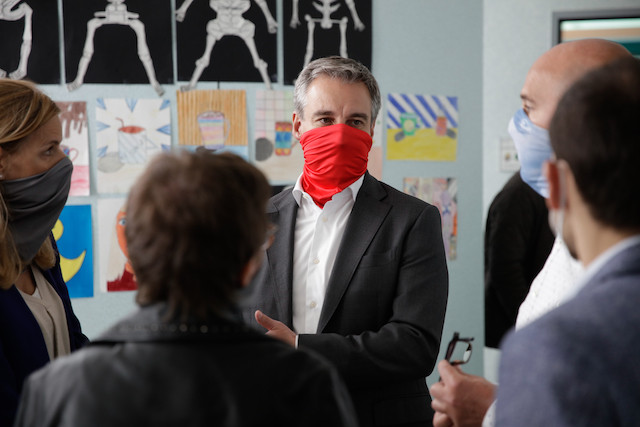Primary schools in Luxembourg were closed the week before the Carnival school break after authorities reported a rapidly growing number of infection clusters. The more contagious UK variant was “massively present” in the samples analysed, Meisch said.
Still, Meisch said he was committed to offering as much classroom teaching as possible, but that this required stricter measures. “Schools are the last thing that should close. Children need school, children need a framework, children also need their teacher, children need social contacts, they need friends.”
They will also need to wear masks at all times when returning to school on 22 February. Primary school pupils previously only had to wear them when moving around the building but could take them off when seated in the classroom. Secondary schools had the choice of asking students to wear masks in the classroom.
The mask mandate also applies to afterschool care facilities (maisons relais). Preschool children (Cycle 1 in the Luxembourg system) and children who cannot wear a mask for medical reasons are exempt.
Meisch said there would be more testing of students and staff, especially in schools where the virus is more prevalent. Starting in March, schools will begin using rapid tests for more frequent updates on how the virus is spreading.
Anyone who was quarantined in future will only be able to return to the classroom after a negative virus test, Meisch said, explaining that too many parents had sent their children back to school after a one-week quarantine period without using the test invitation.
“This risk has become too great and we cannot tolerate this anymore,” Meisch said, adding that children without a negative virus test will have to remain in quarantine for longer.
Meisch did not rule out that schools would have to switch to remote learning or hybrid teaching formats again in future, depending on how the pandemic develops. The ministry has 5,000 tablets at its disposal to support children who have no devices available when learning digitally, the minister said.
But he also urged parents, teachers and pupils to talk more with each other. “We should not only look at the virus but also at how our young people are doing, and the message is clear: A lot of young people currently aren’t doing well in this pandemic,” Meisch said. School psychological support services reported a 15% increase in students with suicidal thoughts, the minister said.
The first year of the pandemic has been marked by restrictions, fears for the future, monotony and loneliness, Meisch said, adding that the country’s youth was being robbed of its childhood and young adulthood. “That time will never come back,” he said. “You’re only young once and you only have one opportunity to make these important experiences in an important phase of your life.”
